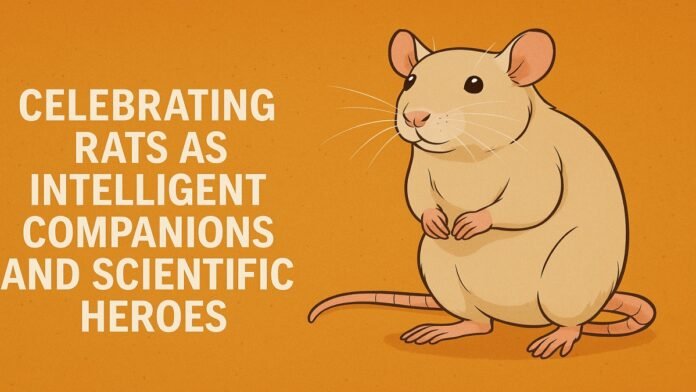
Key Points:
- World Rat Day is celebrated annually on April 4 to honor rats as pets and their contributions to science.
- Established in 2002, the day aims to dispel negative stereotypes about rats and highlight their intelligence and loyalty.
- Rats play vital roles in medical research, cultural traditions, and ecosystems worldwide.
- Fun facts include their sharp memory, swimming skills, and ability to gnaw through concrete.
- Advocacy groups use the day to promote better treatment and appreciation for rats.
April 4 marks World Rat Day, a global celebration dedicated to appreciating rats as pets, companions, and contributors to science. Established in 2002 by rat enthusiasts, this day seeks to challenge misconceptions about these creatures and recognize their many virtues.
Rats have been part of human history for centuries. From their role in mythology as Lord Ganesha’s vehicle in Hindu tradition to their use in groundbreaking medical research, rats have proven their importance time and again. Despite being unfairly associated with disease and destruction, they are intelligent, social, and affectionate animals that make excellent pets.
The Role of Rats in Science
Rats are invaluable in the field of medical research. Their physiology closely resembles that of humans, making them ideal models for studying diseases such as diabetes, cancer, Alzheimer’s, and even COVID-19. Since the 1960s, rats have contributed to the development of life-saving treatments and vaccines. Their larger size compared to mice allows researchers to conduct complex studies on organ transplantation, cognition, and memory.
In fact, the genome of rats was decoded in 2004, further enhancing their utility in scientific investigations. Rats are also used in behavioral studies due to their ability to learn tasks quickly and demonstrate emotional intelligence.
Fun Facts About Rats
Rats are fascinating creatures with unique characteristics:
- Rapidly Growing Teeth: Rats’ front teeth grow continuously up to 1-2 inches annually requiring them to gnaw on hard materials like concrete or wood.
- Sharp Memory: Rats never forget a path they’ve traveled once.
- Swimming Skills: They can swim effortlessly in deep water.
- Flexibility: Rats can survive falls from heights of up to 50 feet without injury.
- Social Behavior: They thrive in groups and even care for sick or injured companions.
- Disease Spreaders: Unfortunately, rats can transmit over 30 diseases to humans.
- No Thumbs: Rats have fingers but lack thumbs.
Cultural Significance
In India’s Karni Mata Temple, rats are revered as sacred creatures believed to bring blessings. Conversely, European folklore often associates them with bad luck. In Chinese astrology, the rat is celebrated as a symbol of intelligence and diligence.
How to Celebrate World Rat Day
World Rat Day offers various ways to honor these remarkable animals:
- Pamper Your Pet Rat: Treat them with special food or toys.
- Host a Rat Enthusiast Party: Gather fellow rat lovers for fun activities.
- Learn About Rats: Watch documentaries or read about their contributions to science.
- Advocate for Better Treatment: Spread awareness about the importance of rats beyond stereotypes.
Rats deserve recognition not only for their companionship but also for their scientific contributions that have shaped modern medicine. Whether you’re a pet owner or simply curious about these creatures, World Rat Day is an opportunity to appreciate their unique qualities and significance in our lives.






































